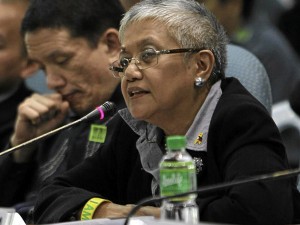Gov’t peace panel to leave for Spain to study Navarra autonomy
MANILA, Philippines—Members of the government panel in the peace talks with the Moro Islamic Liberation Front were set to leave Tuesday for Spain for a week-long study of autonomy.
Presidential Adviser on the Peace Process Teresita Quintos-Deles said the visit of the government officials to Navarra, Spain, was part of the preparations for the drafting of the annexes to the Framework Agreement on the Bangsamoro that the Aquino administration and the MILF signed on Oct. 15.
Officially called the Comunidad Foral de Navarra (Regional Community of Navarra), Deles said the northern Spanish autonomous community “practices a high degree of self-governance, but operates within Spain’s structure as a nation of autonomous communities.”
“(T)he trip will give insights to the Philippine delegation on how Navarra’s governance works, which can be useful in the drafting of annexes and in further discussions of the details of the signed framework agreement,” Deles said in a statement.
She said the visit, financed by the Spanish government’s Agencia Española de Cooperación Internacional para el Desarollo, would also provide “lessons and insights” to the crafting of the basic law for the creation of the new Bangsamoro political entity.
“The trip also hopes to inspire models for the yet to be established Bangsamoro set to replace the current ARMM (Autonomous Region in Muslim Mindanao),” the presidential peace adviser said.
Last March, Deles said MILF officials attended a similar exposure trip to Catalan, another autonomous region in Spain, to observe its experiences in governance.
Deles said the government peace panel had started working on the draft of the annexes of the framework agreement ahead of the next round of talks with the MILF in Kuala Lumpur, Malaysia next month.
She said the government negotiating team had been holding initial discussions with the human development and poverty alleviation cluster of the Aquino administration.
An ad hoc interagency meeting on “normalization” will also be held on Oct. 29, she added.
“Both parties, through their technical working groups, expect to complete at least three annexes on power-sharing, wealth-sharing and normalization by the end of the year,” she said.
Since the initial peace agreement was inked by both parties last week, Deles said members of the negotiating teams had been closely coordinating to prepare the details of the framework agreement and submit the annexes within the year.
“An executive order to be issued by President Benigno Aquino III is expected to be drafted and released two to three weeks from now,” she said.
Deles said the executive order, which she said “is expected to be supported by Congress through a resolution,” would form the Transition Commission, which would be composed of 15 members—eight from the MILF and seven from the government.
